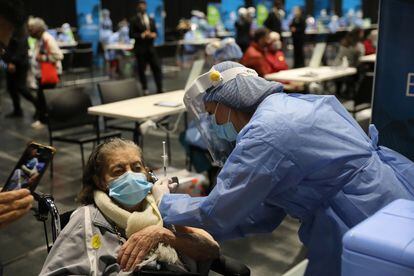A nurse applies a vaccine against covid-19, in Bogotá on March 12.Carlos Ortega / EFE
The human rights crisis in Latin American countries before the pandemic has deepened over the past year.
In the current vaccination scenario, in which the doses do not reach those who should and the lack of transparency in the strategy has generated distrust in the population, Amnesty International warns in a report published this Thursday about the urgency of taking measures so that the vaccination plans reach more people.
For the organization, the information is the first step and it is not enough to put it on a website.
Especially since almost 40% of households in Latin America and the Caribbean have no connection.
"An attempt should be made to broadcast it on other channels, such as radio, especially on community radio stations of indigenous or Afro-descendant populations," the document reads.
In addition, the NGO highlights, official data on the pandemic must be translated into all the languages spoken in each country.
Although several made material about the covid in indigenous languages, the same has not happened with the information on vaccination.
Amnesty International describes as "worrying" that governments are not respecting the right to access information on immunization programs and singles out the pharmaceutical companies for having been not very transparent in the negotiations with the countries of the region.
Of 17 requests made by the organization for specific contracts or data on how the doses have been negotiated, only seven countries responded and not fully.
The NGO insists on calling on States to prioritize groups that are exposed to a greater risk in the pandemic or that are historically subject to discrimination.
The report cites some examples of how shameful the vaccination process has been in Latin America.
In Peru, in the first days of February it was learned that hundreds of state officials had received the vaccine before it was their turn.
Former president Martín Vizcarra was included in the privileged list.
A few days later, in Argentina popular indignation grew after it was learned that businessmen, journalists and government employees had been vaccinated without being included among the priority groups.
Most of the countries in the region went into lockdown a year ago when the pandemic added to the health, economic and human rights crises that already existed.
In 2021, marked by electoral days in several countries, Latin America could be a victim of the use of vaccines for political purposes.
"Electoral cycles can be times when governments could put pressure on certain sectors of society that criticize them," says Amnesty in the report, which recalls that irregularities by those who hold public office are common in the region.
In Brazil, which already exceeds 3,000 daily deaths from covid, President Jair Bolsonaro's anti-science speech has generated confusion in the national health strategy.
Vaccines - the report highlights - have been the cause of political conflict between the president and governors who have tried to provide vaccines on their own in the regions.
In Nicaragua, besides the fact that there is practically no official information about the vaccination plan, the press and dissidents have been persecuted, while health personnel have been abandoned.
Amnesty International questions that there are still countries such as Cuba, Nicaragua, Ecuador or Venezuela that have not published an official vaccination protocol and limit themselves to making statements that do not offer a clear roadmap and at this moment so necessary.
Uruguay, which during 2020 was considered an example for its rapid response to the pandemic, despite a considerable spike in infections in recent months has offered minimal information about its immunization campaign.
It even started without having published a full national plan.
Migrants must be included
When migrants from Latin America are outright denied access to vaccines, they are hindered in obtaining it.
The countries of the region have not fully understood that, as the office of the United Nations High Commissioner for Refugees put it, "including refugees in vaccination campaigns is key to ending the pandemic."
In the Dominican Republic, the president, Luis Abinader, has publicly stated that undocumented migrants will not receive the vaccine.
Which leaves out thousands of people born to foreign parents who registered as Dominican, but are not recognized.
Mexico does not mention migrants, refugees or asylum seekers in its official plan and although it has announced that they will be included, according to the complaints known to Amnesty it is not clear what the current treatment is given to foreigners.
In Colombia, which has included Venezuelan migrants, there are still doubts about whether those who are not regularized will be able to receive the vaccine.
The distribution of the vaccine deserves to be fairer, as does the decision-making on the management of the pandemic.
According to the Amnesty International report, women are very underrepresented despite the fact that they make up 70% of the region's health personnel.
In Argentina, for example, in the expert committee on covid-19 there are four times more men than women.
The organism calls to guarantee the due vaccination and participation of the women.
"In some contexts, women are disadvantaged in access to health care, political and social status, and decision-making authority due to the structural social characteristics of their communities," the report cites.
The indigenous peoples of Latin America, systematically excluded from public policies, have once again become victims of states that do not recognize them.
Of 13 countries that have published their vaccination plan, six do not mention any protocol for the care of these communities.
The gaps that already existed in the region are increasingly accentuated by the pandemic.
Subscribe here to the EL PAÍS América newsletter
and receive all the information keys on the region's current affairs

